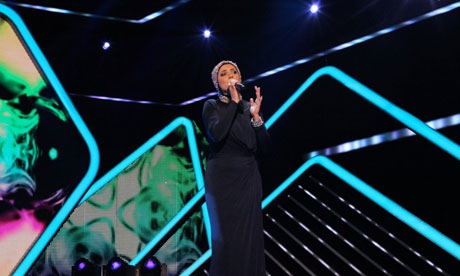 Millions vote for Ermia, 31, to win 'Iranian X Factor', but conservatives accuse her of trying to tarnish Islam
Millions vote for Ermia, 31, to win 'Iranian X Factor', but conservatives accuse her of trying to tarnish IslamAt family gatherings up and down Iran, the big topic of conversation in recent weeks has been how to vote not in the imminent presidential elections, but in a reality TV show recorded by exiles abroad that has become an instant hit in living rooms back home.
Last week, millions of Iranians voted for their favourite singer on Googoosh Music Academy, Iran's version of the X Factor. Curiously, the series was transmitted from London by an exiled television channel,Manoto TV. Like other opposition channels, Manoto (which translates as "me and you") is accessible in Iran via illegal satellite dishes installed on rooftops.
Its glamorous shows, which include a version of Come Dine With Me, have provided Iranian households for the first time with access to the kind of professionally made popular television programmes absent from state TV.
"Everywhere I go, anyone I visit, the talk is the Googoosh Academy," said Mehran, a Tehran resident, on Facebook. "People in our country are exhausted by all sorts of financial and social difficulties these days and this show has lifted our spirits, at least for a short while."
This year, the winner of the $25,000 (Ł16,500) prize is Ermia, a 31-year-old vocalist who has defied religious restrictions to sing in public as a married woman, but at the same time covers her body from head to toe while performing.
Alas, not everyone believes the result is fair. Iranian elections have been bedevilled by charges of fraud, and Googoosh Academy appears to be no exception. "People talk about the Academy but 90% of their conversation is about whether the votes were rigged this year," said Hossein, a university student from the city of Karaj. "It just doesn't add up, she is a paradox: she has the hijab but she sings. How come she got the most votes? I have no idea."
Ermia's win has prompted nationwide discussions, especially among Iranian web users, about the hijab. Some more secular Iranians accuse her of having ties with the Islamic republic because she is covered, while others mostly conservatives inside Iran accuse her of trying to tarnish the image of Islam.
According to Manoto's website, Ermia, a former student of philosophy at Tehran University, is from the small city of Khomein south-west of Tehran, incidentally the home town of the late founder of the Islamic republic, Imam Khomeini, and now lives in Germany with her husband.
She had always liked singing, according to the website, but had never had the courage to participate in such a singing competition in the past. "You can also sing with a hijab," her husband assured her, according to Manoto. She is cited as saying there's "no contradiction between singing and hijab".
Hassan Taehrani, an artist who travelled to towns and villages in southern Iran while Googoosh Academy was on air, said Iranians outside the big cities were following the singing competition very closely.
"Ermia was people's favourite in the smaller cities I visited," he said. "She had lots of followers not because she sang very well but because people had sympathy with her. The truth is that she is like many of us in society who are left somewhere in middle of tradition and modernism."
Masoud Behnoud, a veteran Iranian journalist, said Googoosh Academy was the first time Iranians had experienced a reality show of this kind and on such a scale. "There have been programmes in the past such as Navad [Ninety], which is a sport show where people phone in to vote, but people's experience with the Academy is the first of its kind. For more than 3 million people to dial a foreign number in a single night in a programme held outside Iran is a definitely a record."
According to Behnoud, the Academy owes most of its success to Googoosh, the famous Iranian pop singer who is one of the programme's three judges. Unlike many of her fellow singers, Googoosh refused to leave Iran for exile after the 1979 Islamic revolution, instead living a quiet life in her country. She finally left in 2000 and sang for the first time after 21 years to the delight of millions of fans.
Behnoud said: "She is a unique figure. Googoosh sang for our grandparents, our parents, for us, and now she's singing for our children. The Googoosh Academy's experience is one that will make Iranian politicians think about new ways of reaching out to ordinary people."
The state's response to the programmer has been to jam signals and accuse its makers of links to "the Zionist regime", a reference to Israel. Nevertheless, even state-affiliated news agencies and websites have conceded that the Academy has become a household name.
Manoto TV was launched in 2009 by Kayvan and Marjan Abbassi, a couple exiled in the UK, and its Facebook page been "liked" by more than 1 million people, seemingly more than any other Iranian page on Facebook.
Manoto TV turned down a Guardian request for interviews with its directors or people behind the show.
Tina Sabouri on Baztab-e-Emrooz, a conservative news website, complained that: "When the state-run television with all its money can't attract old and young audiences during Nowruz [new year], people would inevitably tune in to TV channels such as Manoto."
Posting a comment on Baztab-e-Emrooz's article about Ermia and her win, an anonymous user said: "I don't have a satellite dish but my 10-year-old child is pressing me to get one and when I ask why, he says all [state] channels only show clerics."
By The Guardian
The Iran Project is not responsible for the content of quoted articles.











